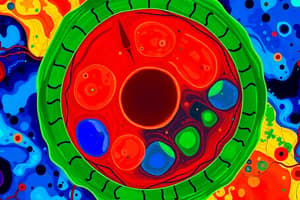Podcast
Questions and Answers
What is the study of the structure, function, and behavior of cells?
What is the study of the structure, function, and behavior of cells?
- Genetics
- Bacteriology
- Cell biology (correct)
- Virology
Which of the following is a fundamental principle of the cell theory?
Which of the following is a fundamental principle of the cell theory?
- Cells are similar in structure and function (correct)
- Cells are not essential for life
- Cells arise from non-living matter
- Cells do not have genetic material
What is the process through which cells are formed?
What is the process through which cells are formed?
- Osmosis
- Photosynthesis
- Cell division (correct)
- Cellular respiration
What are the building blocks of all living organisms?
What are the building blocks of all living organisms?
What is the function of the Golgi apparatus in a cell?
What is the function of the Golgi apparatus in a cell?
What is the main function of ribosomes in a cell?
What is the main function of ribosomes in a cell?
Which organelle is known as the 'powerhouse' of the cell?
Which organelle is known as the 'powerhouse' of the cell?
What is the primary function of the cell membrane?
What is the primary function of the cell membrane?
What is the central organelle of the cell that contains the cell's genetic material?
What is the central organelle of the cell that contains the cell's genetic material?
What is the process by which cells produce offspring?
What is the process by which cells produce offspring?
Flashcards are hidden until you start studying
Study Notes
Bio: The Fundamentals of Life
Bio, or biology, is the natural science that studies life and living organisms. It is a multidisciplinary branch of science that draws from chemistry, physics, and mathematics to understand the complex processes that support life. In this article, we will explore the subtopics of cell biology, which is the study of the structure, function, and behavior of cells, the basic units of life.
The Cell Theory
Cell biology is based on several fundamental principles known as the cell theory. These principles include:
-
Cells are the basic unit of life: Cells are the building blocks of all living organisms, and they perform the essential functions of life, such as growth, reproduction, and maintenance.
-
Cells are the basic unit of structure: The structure of an organism is determined by the arrangement and functions of its cells.
-
Cells arise from pre-existing cells: Cells are formed through the process of cell division, which involves the duplication and separation of the cell's genetic material and cytoplasm.
-
Cells are similar in structure and function: Despite their differences in size, shape, and function, cells share common characteristics, such as a cell membrane, cytoplasm, and genetic material.
The Structure of Cells
Cells are complex, dynamic structures that are composed of various organelles and systems. These organelles perform specific functions that contribute to the overall functioning of the cell. Some of the key organelles in cell biology include:
-
Cell membrane: The cell membrane, also known as the plasma membrane, is a selectively permeable barrier that encloses the cell and regulates the movement of substances in and out of the cell.
-
Nucleus: The nucleus is the central organelle of the cell, and it contains the cell's genetic material, or DNA.
-
Mitochondria: Mitochondria are the "powerhouses" of the cell, as they produce the energy currency ATP through a process called cellular respiration.
-
Ribosomes: Ribosomes are responsible for protein synthesis, which is the process of creating proteins, the building blocks of cells.
-
Endoplasmic reticulum (ER): The ER is a network of tubular structures that participate in the synthesis, modification, and transport of proteins and lipids.
-
Golgi apparatus: The Golgi apparatus modifies, sorts, and packages proteins and lipids for transport to their final destinations within the cell or to the cell surface.
The Function of Cells
Cells perform a wide range of functions that are essential for the survival and growth of living organisms. Some of these functions include:
-
Growth and development: Cells grow and divide to increase in size and number, leading to the growth and development of an organism.
-
Reproduction: Cells produce offspring through a process of cell division, which involves the duplication and separation of genetic material.
-
Maintenance: Cells maintain their internal environment, or homeostasis, by regulating the levels of substances such as nutrients, waste products, and water.
-
Response to stimuli: Cells respond to external and internal stimuli, such as hormones and mechanical forces, by altering their behavior and function.
In conclusion, cell biology is a crucial subtopic within the broader field of bio, or biology. By understanding the structure, function, and behavior of cells, we can gain a deeper appreciation for the complex processes that support life and the diversity of life forms on our planet.
Studying That Suits You
Use AI to generate personalized quizzes and flashcards to suit your learning preferences.




